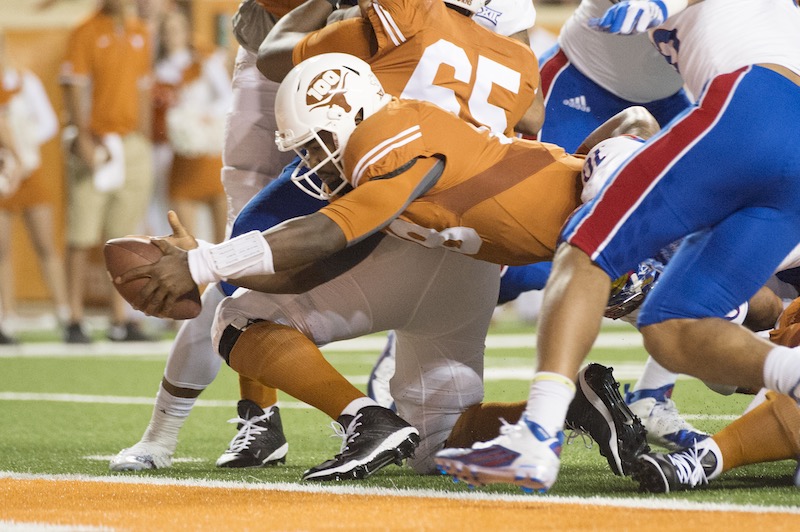UT Football: Half Glass Full?
Horns in sight of a bowl; while Missouri raises other possibilities
By Kahron Spearman, 9:30AM, Tue. Nov. 10, 2015
How could the Kansas game be viewed?
“The resurgent Texas Longhorns, powered by Swoopes’ five touchdowns, destroy the hapless Kansas Jayhawks, 59-20!”
Or: “With a few lucky breaks, the lowly Texas Longhorns get an unexpected win over a tricky Kansas squad.”
Watching the game, neither of these ring true. It’s hard to know how “resurgent” Texas is. Kansas is the worst team in the Big 12, but there are some very specific reasons for that.
Swoopes’ five touchdowns, while a great accomplishment, are a little deceiving. There were definitely a few breaks, especially early.
So here we go.
In the closest blowout in Longhorn history, the young team (sort of) dominated the even younger Kansas Jayhawks, in an interesting 59-20 victory.
Breakdown:
Texas’ youth showed, bearing out in every direction, but the Horns were never truly tested after the third quarter – Texas now sits 9-1 under Strong, when scoring first, but 0-11 when flipped. Truthfully, Kansas looked like Texas usually has this season.
Positives:
Texas offense lived its best life, utilizing the explosive plays largely missing this season. They gained over 100 yards passing for the first time in three games, settling at just under 300 (Heard had 201, Swoopes 98).
There were some interesting ideas used in the second half, especially the Heard’s featured roll-outs, which could force defenses to reset and chase. It’s one of the few moments where Texas’ offense showed an ability to dictate terms of engagement.
Balancing out the bombs-away approach, the Horns ran for another 299 yards. Big back D’Onta Foreman rushed 12 times for 157 yards, mostly coming from a 93-yard touchdown burst. The blocking was spotty in stretches, but they showed definite improvement.
Of course, the 18 Wheeler ran and passed for five touchdowns.
And that’s actually about it – for one reason. Texas is still playing down to their competition.
Negatives:
Let’s examine the Kansas Jayhawks’ makeup: 38 first-year players, 32 first-time starters. They have 11 freshman starters, including a true freshman QB in Ryan Willis. There are only 67 scholarship players and 47 walk-ons.
Simply put, Kansas isn’t just the worst team in the Big 12 – it’s the youngest, most lacking in talent, and least experienced, by far. Yet, in the first half, Texas could not put their distinct advantages in talent, depth, and (relative) experience to use.
261 of Texas’ 598 yards came on four plays, including two 90-plus burners. Three of Swoopes' scores came after the game was in hand. Even with Haines’ interception, and other short fields coming via muffed punts and fumble recovery, the offense was mostly inefficient against one of the worst defenses in FBS play.
The defense showed multiple lapses, in basic assignment football, allowing themselves to be blocked by inferior athletes. Texas was in a position to put the Jayhawks away early, but Kansas was able to score to end the first quarter – a first in three games – by screen-passing or running directly at the Horn’s front seven.
Kansas kept itself in scoring position in the second quarter, but had a touchdown overturned and missed a field goal on the last possession of the half. The Horns were actually fortunate not to be tied at the half, even with the breaks.
Without an iota of exaggeration, this should have been a sound 70-0 blowout.
Prediction for West Virginia:
Coming in as an eight-point favorite, West Virginia’s spread is efficient and nuanced – long scoring droughts are not a problem the Mountaineers worry about. In a must-win, the Horns are looking bowl eligibility in the face, and staring it down. If the defense cannot get somewhat consistent stops, it will be another road loss for Strong’s record.
But, I have faith – or at least faith in the power of fear of missing out on a bowl, which should take the effort up a notch or two. Texas wins a nailbiter, 35-31.
Quick Note (Okay, Not So Quick):
The Missouri Problem
In important non-Texas news, University of Missouri President Timothy Wolfe and Chancellor R. Bowen Loftin resigned on Monday, Nov. 9. Wolfe is leaving immediately, while Loftin stays on Sepp Blatter-style until the end of the year.
Both leave amid protests, boycotts, and one student’s hunger strike. Even Missouri’s governor, Jay Nixon, issued a terse statement regarding the protests, admini-shading the university, which of course hired the two administrators, and remains on the hook.
Make no mistake, even after months of valiant effort by both students and faculty, the university surely chose to act for two major reasons. (Wolfe and Loftin certainly did not leave willingly – their “resignations” merely saving what’s left of their pitiful faces, and buying the university time.)
The situation became overwhelming – and exponentially untenable – when the Tiger football team’s black players announced they would not play until Wolfe resigned. Head coach Gary Pinkel took a definitive stand alongside his players, upping the ante considerably.
On top of the accusations of racism levied at the university, a cancellation of Saturday’s matchup versus BYU would have cost Missouri $1 million – which only accounts for the game itself. For all major institutions leaning on athletics, what’s occurred is an event of (potentially) seismic proportions.
The threatened boycott occurred after student activists reached out to the team’s black players about a set of problems Missouri’s administration was doing little to fix (and at times exacerbating), and connected those issues to the university’s bottom line.
Though starting with larger (ongoing) societal issues, encouragement of the players to wield their lone superpower of “playing sport X, especially football” – a principal revenue driver for the every university in a major conference – to effect serious change is a game-changer on multiple fronts.
The players, specifically the African-Americans who make up the majority of college football and basketball teams, just learned they can instantly disturb the equilibrium, by positioning themselves as direct stakeholders and purse-string pullers.
For the university – any university, any capitalist institution, in any circumstance – this simply will not do.
This could have nationwide ramifications, and is surely making tidal waves around and among school administrators, conference presidents, apparel-makers (Nike, for example), television networks (any with football or basketball agreements), and the NCAA – whose troubles are well-noted and growing.
How would you stop student-athletes from forming future coalitions with student activists? Any sort of punishment, such as attempting to isolate student-athletes or revoking scholarships, would prove difficult because of the legal ramifications and possible civil rights violations.
Picture a scenario in which the players boycotted the national championship, or decided to make March Madness their soapbox for pertinent issues. Imagine Texas’ football team deciding against playing Oklahoma, in the Red River Shootout, because of an unaddressed racist incident on campus.
Moreover, and more importantly, the business of universities, such as UT, is inextricably bound to the athletic programs – they directly affect all ends, including enrollment and non-athletic programming. There’s simply no protocol, no written course of action, for what’s possible if student-athletes decide to start flexing their bargaining power.
It’s incredibly early, but a grand chess game has begun. You can be sure universities are steeling themselves and turning toward legal counsel. Athletes must ready themselves in similar fashion.
A note to readers: Bold and uncensored, The Austin Chronicle has been Austin’s independent news source for over 40 years, expressing the community’s political and environmental concerns and supporting its active cultural scene. Now more than ever, we need your support to continue supplying Austin with independent, free press. If real news is important to you, please consider making a donation of $5, $10 or whatever you can afford, to help keep our journalism on stands.









